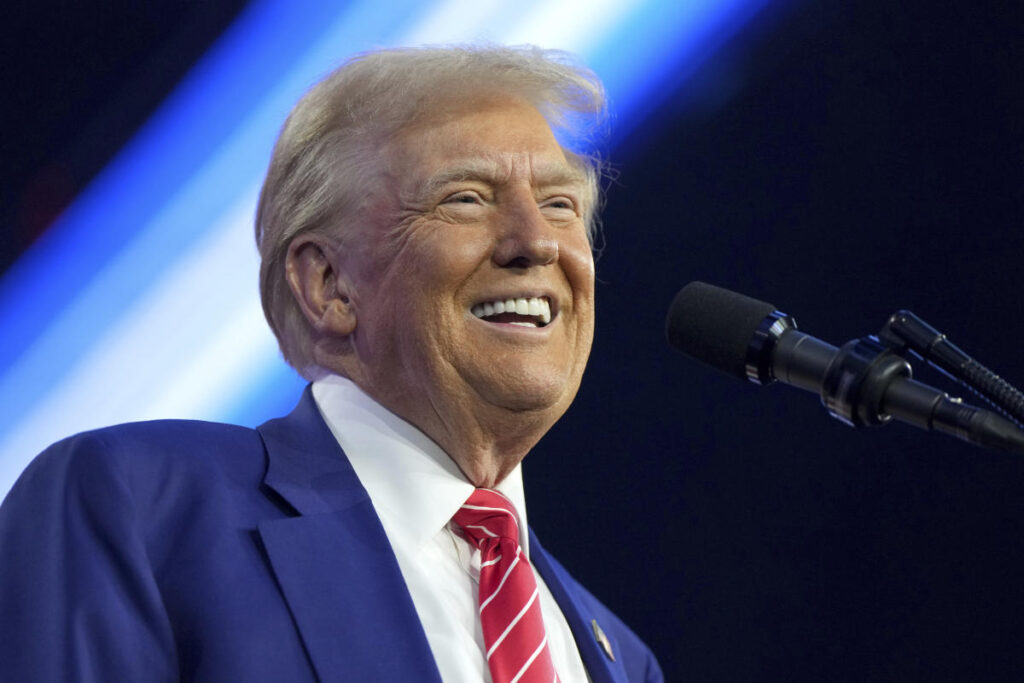As the possibility of a partial government shutdown loomed over Washington, far-right personalities convened at Turning Point USA’s AmericaFest 2024 in Phoenix, Arizona, rallying thousands of passionate supporters of former President Donald Trump. The event highlighted the deep divisions within his party, particularly focusing on Trump’s influence in rejecting bipartisan solutions to avoid the shutdown. Prominent figures like Steve Bannon criticized House Speaker Mike Johnson for his willingness to collaborate with Democrats. Bannon’s rhetoric emphasized an aggressive approach labeled as “hyper-partisanship,” calling for the dismissal of traditional bipartisan efforts, which he described as a “malignant cancer” afflicting the political landscape. The gathering underscored the rising tension and conflict within the Republican coalition in the wake of Trump’s presidency as members struggled over governance directions amid his leadership style.
Trump’s relationship with his base remains complex and indicates a dynamic interplay between his leadership and the desires of his supporters. The attendees expressed a mixture of views that transcended a singular policy agenda, primarily united by a shared allegiance to Trump and a strong anti-establishment sentiment. Many of these supporters are vocal about their social conservatism and patriotism. For instance, Andrew Graves, a former Disney employee now organized with Turning Point, encapsulated the desire for Trump to fulfill his campaign promises, focusing on issues like education and immigration without delving deeply into fiscal concerns, like national debt. Other supporters echoed this sentiment, combining personal priorities like religious values, national strength, and various policy preferences into their support for Trump, showcasing an eclectic but fervent devotion to his vision of America.
The convention atmosphere was steeped in a revolutionary spirit, drawing heavily on imagery and slogans familiar within Trump’s movement. Attendees donned “Make America Great Again” gear and engaged enthusiastically with speakers who evoked the Times of Change, rallying for the confirmation of Trump’s Cabinet nominees and even proposing the imprisonment of members of Congress involved in investigating the events of January 6, 2021. Turning Point founder Charlie Kirk captured the mood when he declared that the GOP’s transformation under Trump’s influence was underway but not yet complete. During the event, prominent speakers like Bannon heralded the gathering as crucial to a larger revolutionary cause, echoing sentiments of historical political realignments that reshape party dynamics and ambitions.
Taking the stage at the event’s conclusion, Trump reiterated many of his longstanding proposals, bypassing discussions of his recent setbacks in Congress while asserting a vision of change that he claims is what the American people voted for. His message celebrated a “common-sense” agenda aimed at ushering in what he described as a “golden age” for the nation. Despite the absence of specifics regarding how he planned to achieve consensus on contentious issues, Trump’s rhetoric appealed to a narrative of hopeful transformation and renewal in the face of challenges. Meanwhile, his supporters continued to affirm their commitment to the broader agenda, envisioning a unified front among diverse interest groups within his coalition, even as they grapple with varying priorities.
Speakers at AmericaFest offered a nuanced view of the complexities surrounding Trump’s policy positions, juxtaposing his ambitious programs with existing conservative apprehensions. Bannon admitted that some initiatives, such as the debt ceiling negotiations, didn’t go as Trump desired but reiterated an unwavering belief in Trump’s planning and potential for future victories. Similarly, commentators like Ben Shapiro navigated the intricate balance between Trump’s supportive stance on foreign aid, particularly regarding Israel, and the populist call among conservatives to reassess the role of the U.S. in international conflicts. Such discussions highlighted the ongoing challenge of reconciling varying perspectives around traditional Republican values of limited government intervention, national security, and the role of populism in evolving party identity.
At the heart of the AmericaFest gathering lies a shared mission underpinned by the desire to push against what attendees collectively termed the “incumbent regime.” Kirk’s call for unity among diverse factions encapsulated the imperative for strategic cohesion as the Republican Party moves forward, seeking to retain Trump’s influence. Offering a platform for differing advocacy, Kirk urged attendees to merge their varied focuses into a collective effort to reclaim America. This message of collaboration resonated through the audience, suggesting an emerging alliance of diverse factions within the party committed to further solidifying their grip on power while navigating the increasingly fraught landscape of American politics. Overall, the AmericaFest event became not only a rallying point for Trump supporters but also a pivotal moment for understanding the complexities of an evolving Republican Party eager to redefine itself amidst the overarching influence of its polarizing figure, Donald Trump.

